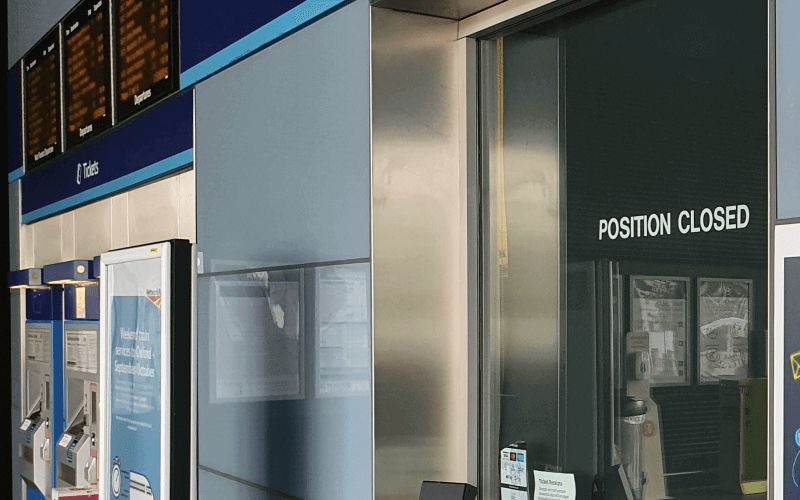Tens of thousands of disabled people could face a huge increase in rail fares for many of their journeys outside London, if government-backed plans to close ticket offices across England are approved, campaigners have warned.
The research by the Association of British Commuters (ABC) shows that the tens of thousands of disabled people who hold a concessionary freedom pass – which entitles them to free travel across much of the capital – could be forced to pay inflated prices for many rail tickets once ticket offices are closed.
The price hikes will also apply to older people holding freedom passes and Londoners who have bought travelcards.
This is because so-called boundary fares are available from ticket offices but not online or from most ticket machines.
Boundary fares allow those with a freedom pass or a London travelcard to pay cheaper fares for many rail journeys outside the capital, as they are only charged for the fare from the edge of the zone covered by that pass.
ABC, a volunteer-led campaign, said it would have a disproportionate impact on older and disabled people and the price hike would be “so severe as to prevent an insurmountable barrier to travel for some of the lowest income groups”.
It believes the issue is a major breach of equality and consumer rights laws.
Emily Yates, ABC’s co-founder, said: “Once again, we are seeing the biggest impacts of ticket office closures falling on those already experiencing the most discrimination and financial pressure.
“It’s important to remember that the price of rail fares already disenfranchises so many people from travel – the people most affected are those who already survive financially by seeking out the discount options, and for whom advice from a ticket office clerk is essential.”
The ABC research shows the boundary fare penalty could mean an off-peak day return from a London terminal to High Wycombe in Buckinghamshire ends up costing £25 rather than £14 with a boundary fare, while an off-peak day return to Three Bridges in Sussex could cost more than £28 rather than £12 with a boundary fare.
One of the biggest price hikes is to Dartford in Kent, with an increase of 190 per cent for an off-peak day return (£11.60 instead of £4), and 234 per cent for an anytime day return (£19.70 instead of £5.90).
It is just the latest research by campaigners that shows how the proposed closure of nearly 1,000 ticket offices across England could negatively impact disabled people.
Asked if it was concerned about the boundary fares issues and the impact on disabled passengers, and what action it planned to take, the Rail Delivery Group – which represents the companies that run Britain’s railways – said: “The availability of boundary fares is being considered as part of the consultation, but no final decisions will be taken until the consultation has been completed.”
It added: “The aim of these proposals is to bring staff out from behind ticket office windows to offer more help for customers buying tickets and navigating stations.
“At the same time ticket vending machines are being upgraded, and we have committed that no customer will have to go out of their way to buy a ticket.
“No plans will be finalised until the end of the consultation period, and we encourage everyone who wishes to view the plans or take part in the consultation to go to their local train company website or visit Transport Focus or London TravelWatch by 1 September.”
DfT did not comment specifically about boundary fares, but it said train companies will be expected in their proposals to take account of whether passengers would easily be able to buy the right ticket for their journey.
A DfT spokesperson said: “Train operator consultations on ticket offices are ongoing and no final decisions have been made.”
A consultation on the proposed closures of nearly 1,000 ticket offices is being run by two passenger watchdogs, Transport Focus and London TravelWatch, and it ends on 1 September.
At the end of the consultation period, Transport Focus and London TravelWatch will have 35 days to examine the responses before deciding whether to object to any of the proposed closures.
If any of the train companies decide to ignore those objections, the disputes will be referred to transport secretary Mark Harper.
A note from the editor:
Please consider making a voluntary financial contribution to support the work of DNS and allow it to continue producing independent, carefully-researched news stories that focus on the lives and rights of disabled people and their user-led organisations.
Please do not contribute if you cannot afford to do so, and please note that DNS is not a charity. It is run and owned by disabled journalist John Pring and has been from its launch in April 2009.
Thank you for anything you can do to support the work of DNS…

 Frustration after government only issues partial ban on new floating bus stops
Frustration after government only issues partial ban on new floating bus stops Report suggests five big ideas that could transform disabled people’s mobility
Report suggests five big ideas that could transform disabled people’s mobility Government’s ‘weak’ response to damning transport access report puts right to travel in ‘grave danger’
Government’s ‘weak’ response to damning transport access report puts right to travel in ‘grave danger’